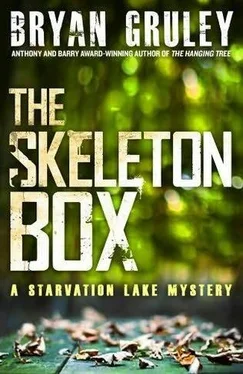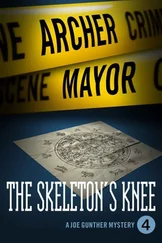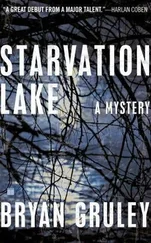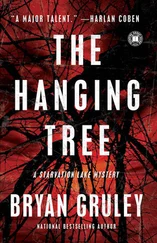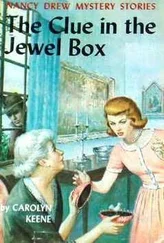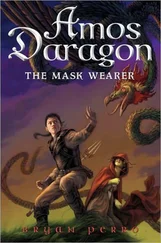Bryan Gruley - The Skeleton Box
Здесь есть возможность читать онлайн «Bryan Gruley - The Skeleton Box» весь текст электронной книги совершенно бесплатно (целиком полную версию без сокращений). В некоторых случаях можно слушать аудио, скачать через торрент в формате fb2 и присутствует краткое содержание. Жанр: Криминальный детектив, на английском языке. Описание произведения, (предисловие) а так же отзывы посетителей доступны на портале библиотеки ЛибКат.
- Название:The Skeleton Box
- Автор:
- Жанр:
- Год:неизвестен
- ISBN:нет данных
- Рейтинг книги:5 / 5. Голосов: 1
-
Избранное:Добавить в избранное
- Отзывы:
-
Ваша оценка:
- 100
- 1
- 2
- 3
- 4
- 5
The Skeleton Box: краткое содержание, описание и аннотация
Предлагаем к чтению аннотацию, описание, краткое содержание или предисловие (зависит от того, что написал сам автор книги «The Skeleton Box»). Если вы не нашли необходимую информацию о книге — напишите в комментариях, мы постараемся отыскать её.
The Skeleton Box — читать онлайн бесплатно полную книгу (весь текст) целиком
Ниже представлен текст книги, разбитый по страницам. Система сохранения места последней прочитанной страницы, позволяет с удобством читать онлайн бесплатно книгу «The Skeleton Box», без необходимости каждый раз заново искать на чём Вы остановились. Поставьте закладку, и сможете в любой момент перейти на страницу, на которой закончили чтение.
Интервал:
Закладка:
Now Tatch had gathered people he had met at church services and at Alcoholics Anonymous meetings, along with his jailed sister’s son, Tex, into a makeshift commune on twenty acres his dead parents had left him. I made my way to him across muddy snow pocked with hundreds of boot prints. Strewn along the ground were a playpen turned on its side, a hockey stick cut short for a little kid, a smattering of dolls in various stages of undress. Two pickup trucks and a Jeep were parked along the two-track road beneath the circle of trailers. Tatch offered his hand.
“Welcome to our little heaven on a hill,” he said.
I took his hand and he said, “Come on, buddy,” and pulled me in for a hug.
“I’m real sorry about Phyllis,” he said.
“Me, too.”
He stepped back. “She was all right. I liked them cookies she used to make us. May the good Lord be with her.”
“Thanks.”
“How’s Darl?”
“You know.”
Tatch and I had long been friends, but more than that, we’d been goalies who played alongside each other. Even though I had started many more games than he had, there was an unspoken agreement between us that we were equals. That’s how it was with goaltenders. It didn’t matter who supposedly was number one, because we were the only ones on the team who understood how alone we were between the goalposts.
I was the better skater, Tatch better at handling the puck. I had a quicker catching glove; he was more agile sliding post to post. You wanted me in the crease when the puck was lost in a scramble of players, but nobody was better than Tatch at stopping a one-on-one breakaway. Only one of us could play the games, though. That Coach chose me undoubtedly frustrated Tatch as much, at times, as it frightened me.
Yet if I had blocked the overtime goal that lost the Rats the 1981 state title, Tatch would have been the first one off the bench to tackle me in celebration. Instead, he was the first to find me on the ice and wrap an arm around me and tell me that I had played the best game I had ever played and I should never forget that.
When we were kids, Soupy had dubbed him Tatch, short for attachment, as in vacuum cleaner attachment sucking pucks into the net. It was hardly flattering as goalie nicknames go, but Tatch painted it in blood red on his goalie mask and had a shoemaker stitch it into his leg pads. Once he was Tatch and not just Roy Edwards or Roy-Roy or Roy Toy, he let his hair grow out and his sideburns go bushy, and the next thing you knew, he was getting hand jobs.
I held up the pair of hockey skates I’d brought. Freshly sharpened Bauers, size 9.
“Tex around?” I said.
Tatch held his hands up. “I ain’t touching those. Bad luck.”
“Where were you last night? The Picks aren’t much good with you, but they really suck without a goalie.”
A semicircle scar creased the skin above his left eyebrow, the mark of a goalie-mask screw pounded in by a slap shot. Tatch treasured the scar as much as his nickname.
“Aw, jeez,” he said, scratching the salt-and-pepper scraggle on his chin. “Had some family stuff.”
“You sure?”
“Sure about what?”
“Family stuff.”
Tatch screwed his face into a question mark. “Why?”
“Dingus was asking.”
“The sheriff?”
“You know any other Dinguses around here?”
“He ain’t got better things to do?”
I really didn’t think Tatch was capable of breaking into someone’s house, especially my mother’s. But he also wasn’t telling me everything.
“Just letting you know,” I said. I looked up the ridge. “What’s going on up there? You building a church?”
Tatch looked relieved that I’d changed the subject. “Got a project going.”
I counted three men and five women scattered across the wooded ridge. They were digging, throwing aside the two feet of snow and jabbing the blades of their long-handled spades and pickaxes into the stubborn winter soil, their faces ruddy with exertion. All around them the ground was torn into shallow gullies that wound between potholes blackening the snowy surface. A backhoe scooped dirt onto snow-flecked mounds. In the middle of the action stood a thin man clapping and shouting orders over the chuffing machine. I didn’t recognize him.
“Busy bees,” I said. “Digging for gold?”
Tatch chuckled again. “Not quite. The good Lord blessed us with an early snowfall, insulated the ground so it ain’t impossible to get in there.”
“But what are you doing?”
“Can’t really talk about it.”
“It’s a secret?”
“You ought to hit the drain commission meeting tomorrow.”
“Why?” I watched the man giving the orders. He was facing away from me now, still clapping his hands in rhythm with the clank of the shovels. “This got something to do with your tax issue?”
After Tatch had planted the trailers on his land, removing the wheels and setting them on cinder blocks as if they were permanent, Echo Township had doubled his assessment, thereby doubling his property taxes. Tatch went before the county tax appeals board in a paisley tie dangling down a yellowed dress shirt he’d probably worn to high school graduation. “Ain’t fair to crank up my taxes just ’cause of crummy old trailers,” he told the board. “I ain’t got that kind of money.” Getting wound up, he went on to insist that he shouldn’t have to pay taxes at all, as his Christian camp was a religious organization protected by the Fourth Amendment. I think he meant the First. The appeals board members, seeing a scarecrow of a man whom they thought of as better than average at blowing smoke rings, assured Tatch they would consider his request. A few weeks later, Tatch’s tax bill showed up, doubled.
From what I saw, I couldn’t imagine how someone could justify the hike, especially given how tough things were in Starvation. But it was easier to shake down Tatch than some company that could afford a court fight.
“Can’t say,” Tatch told me. “Show up tomorrow.”
Drain commission meetings weren’t one of my favorite things to cover. “Gotcha,” I said. I held up the skates. “You want to take these?”
“No way, buddy. Tex’s got to take them hisself.”
“His first superstition,” I said. “A sure sign of maturity.”
Helpful assistant coach that I was, early in the season I had done Tex a favor by taking his skates to be sharpened. The next day, he scored four goals and assisted on two others in an 8–2 River Rats’ win over a team from Alpena.
Although Tex had the speed and size and smarts to score four goals and two assists in almost any game, he convinced himself that his big night had nothing to do with the talent that was luring college scouts to River Rats games, but with the fact that I had taken his skates to be sharpened. From then on, I always took his skates. Usually I gave them back to him at the rink, but today we had a pregame skate I wasn’t sure I’d make, so I’d brought them out to Tatch’s camp.
“Did I hear my name?”
Tex bounced out of the trailer behind Tatch in sweats and high-top sneakers, unlaced. He slapped Tatch hard on the shoulder. Tatch lurched forward and I caught him with one hand.
“What’s up, Coach?” Tex said.
Tatch twisted around to look at the boy. “You trying to kill your uncle?”
Tex grinned. “Sorry, old man.”
“Got your skates,” I said.
On the trailer, a shred of cardboard duct-taped over a cracked window waggled in the breeze. I smelled something wafting out, at once acrid and sweet, maybe canned beans burned onto the inside of a pan. A preacher’s voice tinned through a transistor radio: “There is no ice in hell…”
Tex squirmed past his uncle, towering over both Tatch and me, pale biceps bulging against the threadbare sleeves of his gray Spitfires T-shirt. “Thanks,” he said, taking the skates. One by one he turned them over, shut one eye, and peered with the other down the length of each blade. Each time, he nodded and said, “That’s it.” Then he looked at me. His hair, black as a puck, was matted on one side. He’d been napping.
Читать дальшеИнтервал:
Закладка:
Похожие книги на «The Skeleton Box»
Представляем Вашему вниманию похожие книги на «The Skeleton Box» списком для выбора. Мы отобрали схожую по названию и смыслу литературу в надежде предоставить читателям больше вариантов отыскать новые, интересные, ещё непрочитанные произведения.
Обсуждение, отзывы о книге «The Skeleton Box» и просто собственные мнения читателей. Оставьте ваши комментарии, напишите, что Вы думаете о произведении, его смысле или главных героях. Укажите что конкретно понравилось, а что нет, и почему Вы так считаете.
